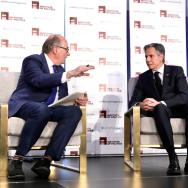Former Vice President Mike Pence, speaking at the University of Chicago on Nov. 29, doubled down on his refusal to testify before the U.S. House panel probing the Jan. 6, 2021, attack on the Capitol, while decrying how President Donald Trump’s rhetoric helped stoke outrage that day.
“Congress has no right to my testimony,” Pence said at an event hosted by the Institute of Politics, arguing that divulging private deliberations could undermine future presidential/vice presidential relationships.
IOP Director David Axelrod, who moderated the discussion, pointed out that Pence reveals private conversations with Trump in his new book, So Help Me God.
“I think the American people deserve my story,” Pence said, drawing a line between his book and testimony before Congress.

Axelrod, who was a senior adviser to President Barack Obama, asked Pence about his loyalty in light of Trump’s words and actions before and on Jan. 6, when a mob stormed the Capitol building.
“You had his back, and he put a target on yours,” Axelrod said, citing the threats made that day against Pence’s life.
Pence acknowledged that he was “angry” at Trump for tweeting that Pence didn’t have the courage to overturn the election results. Axelrod said that many people appreciated Pence’s actions on Jan. 6, which he called “a remarkable act of courage,” but many also wonder why Pence won’t reject Trump.
“I don’t want to pretend about those moments,” Pence said. “His words were reckless. They endangered my family, and they endangered everyone at the Capitol. … In that moment, he decided to be part of the problem,” Pence said, while emphasizing that he and other officials chose to move forward and undertake their Constitutional duty and confirm the results of the 2020 presidential election.
Axelrod asked whether Pence could vote for Trump again in “good conscience.” Pence would only say that he has “great confidence in the American people,” and that it’s up to voters to decide Trump’s fate.
“With regard to the future, I think we’ll have better choices,” he said.
Reflecting on the 2022 midterms, Pence said that GOP candidates who “focused on the future” and offered solutions to inflation and crime issues did well. Those who were focused on the past and “relitigating the last election” did not fare well.
Pence said he thinks voting laws should be strengthened to ensure fair voting, and that both parties should accept legitimate election results and move on.
Q&A with UChicago students
During a Q&A session, a third-year UChicago student, Solana Adedokun, asked Pence to talk more about his reasoning for not testifying before the Jan. 6 House committee. Pence said he objects to a committee that was appointed by one party, calling it “anathema to me.” Axelrod noted that Senate Republicans last year blocked a bill to create a bipartisan, independent commission.
In his answer, Pence cited the government’s separation of powers. “We have two co-equal branches of government, so Congress doesn’t work for the executive branch; the executive branch doesn’t work for Congress,” Pence said.
“His words were reckless. They endangered my family, and they endangered everyone at the Capitol.”
Pence said he supported some senior staff members testifying before the panel.
Another student asked if Pence had any regrets about the initial response to the pandemic and lockdown in order to help contain the spread of COVID-19. Pence said it’s important to judge people by what was known at the time. He said he felt it was necessary to ask the American people “to take a knee” as the government formed its strategy amid the “fog of the pandemic.”
“I do regret that what was meant to be a temporary solution to buy us time became policy in many Democrat-led states … who took the idea of slowing the spread and went on to close schools and keep businesses closed for months on end.”








